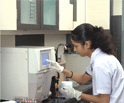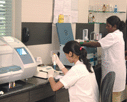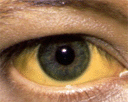Welcome to Shreeji Pathological Laboratory
URINE MICROALBUMIN TEST
A Microalbumin test checks urine for the presence of protein called "ALBUMIN"
Albumin is normally found in the blood & filtered by the kidneys. When the kidneys are working properly, albumin is not present in the urine. But when the kidneys are damaged, Small amount of albumin leak into the urine. This condition is called "MICROALBUMINURIA".
Microalbuminuria is most often caused by kidney damage from diabetes. But many other conditions can lead to kidney damage, such as high blood pressure, heart failure, cirrhosis, or systemic lupus erythematosus (SLE).
If early kidney damage is not treated, large amounts of albumin & protein may leak into the urine. This condition is called "MICROALBUMINURIA" or "PROTEINURIA". When the kidney spill protein, it means kidney is damaged. This can lead to chronic kidney disease.
WHY THIS TEST IS DONE?
A microalbumin urine test is done to check for protein (albumin) in the urine. Early detection may change treatment in an effort to preserve as much kidney function as possible.
SAMPLE COLLECTION:
A microalbumin urine test can be done on a sample of urine collection randomly (usually after the first time you urinate in the morning), a sample collected over a 24 hour period, or a sample collected over a specific period of time such as 4 hours or overnight. A morning sample gives the best information about Urine microalbumin test. It is advisable to collect urine sample in a clean container obtained from the laboratory.
RESULTS:
A microalbumin test checks urine for the presence of a protein called 'ALBUMIN'.
ALBUMIN IN URINE |
||
NORMAL |
Less than 30 mg of albumin in 24 hour. Less than 29 mg/L for 10 hour (overnight) collection. | |
ABNORMAL RESULTS:
If you have 2 to 3 high results in a 3-6 months period & you have diabetes, your doctor may find kidney damage (diabetic nephropathy). Even though diabetes is the most common reasons for high results, certain other illnesses can also cause microalbuminuria.
Diabetes during pregnancy or pregnant women with diabetes or hypertension should check urine for microalbumin.
FACTOR AFFECTING TESTS:
- Taking medicines, such as aspirin, cortico, steroids or some antibiotics.
- Having menstrual bleeding or vaginal discharge, which may temporarily affect the urine sample.
Top
HOW ONE CAN DIAGNOSE DENGUE AFTER 1 DAY OF FEVER
Fever is a symptom caused by various infections in the body. It could be Malaria, Typhoid, various viral or bacterial infection etc. To diagnose the cause of fever, besides routine blood and smear examination specific antigen, antibody test help in early diagnosis of the disease. Which helps the clinician in timely treatment of the patient.
DENGUE NS1
Dengue viruses are transmitted by the mosquito Ades aegypti & Ades albopictus. Mosquitoes are widely distributed throughout the tropical &subtropical areas of the world.
Dengue is considered to be the most important arthropod borne viral disease due to the human morbidity & mortality it causes.
Dengue NS1 is a highly conserved glycoprotein that is present at high concentrations in the sera of dengue infected patients during the early clinical phase of disease. NS1 antigen is found from the 1st day up to 9 days after the onset of fever in sample of primary & secondary dengue infected patients.
Usually IgM does not become detectable until 5 to 10 days after the onset of illness in case of primary dengue infection & until 4 to 5 days after onset of illness in secondary infection. In primary infection IgG appear at the 14th day & persist for the life. Secondary infections shows that IgG rise within 1 2 days after the onset of symptoms & induce IgM response after 20 days of infection.
| THE NS1 IS EXPECTED TO BE DETECTED 1 DAY AFTER THE ONSET OF FEVER & PERSIST UPTO 9DAYS IN BOTH PRIMARY & SECONDARY INFECTIONS. BUT IF ANTI NS1 ANTIBODIES ARE PRODUCED THEN THE DETCTION OF NS 1 IS INHIBITED. |
Top
HbA1c
HbA1c is a lab test that shows the average amount of sugar in your blood over 3 months. In the blood stream are the red blood cells, which are made of a molecule, haemoglobin. Glucose sticks to the haemoglobin to make a 'glycosylated haemoglobin' molecule, called haemoglobin A1C or HbA1C. The more glucose in the blood, the more haemoglobin A1C or HbA1C will be present in the blood.
Red cells live for 8 -12 weeks before they are replaced. By measuring the HbA1C it can tell you how high your blood glucose has been on average over the last 8-12 weeks.
Glucose levels fluctuate from minute to minute, hour to hour, and day to day. Thus for hour to hour control, or day to day, a glucose level is the best guide. The HbA1C level changes slowly, over 10 weeks, so it can be used as a 'quality control' test.
How the Test is Performed
A blood sample is needed.How to Prepare for the Test
No special preparation is needed.Why the Test is Performed
Your doctor may order this test if you have diabetes. It shows how well you are controlling your diabetes. The test may also be used to screen for diabetes.Normal Results
An HbA1c of 6% or less is normal.The following are the results when the HbA1c is being used to diagnose diabetes:
- Normal: Less than 5.7%
- Pre-diabetes: 5.7% to 6.4%
- Diabetes: 6.5% or higher
If you have diabetes, try to keep your level at or below 7%. You and your health care provider must decide what a normal level is for you.
This test is most important for pregnant diabetic women because uncontrolled diabetes may risk the lives of the mother and the child; therefore ignorance about the degree of control of the disease is undesirable.
What Abnormal Results Mean
| Amount of Glycosylated Haemoglobin | Control of Diabetes |
| 6 to 8 % | Excellent |
| 8 to 10% | Good |
| 10 to 12% | Satisfactory |
| Above 12% | Unsatisfactory |
Abnormal results mean that you have had high blood sugar levels over a period of weeks to months.
If your HbA1c is above 6.5% and you do not already have diabetes, you may be diagnosed with diabetes.
If your level is above 7% and you have diabetes, it means that your diabetes control may not be as good as it should be.
In general, the higher your HbA1c, the higher the risk that you will develop problems such as:
- Eye disease
- Heart disease
- Kidney disease
- Nerve damage
- Nerve damage
If your HbA1c stays high for a long period of time, the risk for these problems is even greater.
Ask your doctor how often you should have your level tested. Usually, doctors recommend testing every 3 or 6 months.
Alternative Names
- Glycated hemoglobin;
- Glycosylated hemoglobin;
- Hemoglobin - glycosylated;
- A1C;
- GHb; Glycohemoglobin;
- Diabetic control index
Tests required for the diabetic patients:
- Blood sugar fasting / Post lunch
- Creatinine
- Blood urea /BUN
- Uric Acid
- Complete blood count
- Urine routine
- Cholesterol
- Glycosylated Hemoglobin
- Urine microalbumin
Top
Allergy Test Panel:
Allergy is an abnormal reaction of our body towards certain external substances. Allergy can occur in us due to hereditary factors or our individual body constitution (genetic make-up). Allergies can be fatal if not detected in time. A severe life threatening form of allergy known as anaphylaxis occurs in certain cases of allergy. Different allergy panels are:1) Respiratory
2) Food
3) Paediatric
Health Camp
HealthCamp2 follows a successful initial Health Camp held in mumbai in December 2006. This event was attended by a diverse range of technologists, entrepreneurs,4
Collection Center
Outsourcing Services through whi ch we function as either a part of, or actually as our clients' entire i nternal department. Our first part y efforts are transparent
- 2/3 Khetan Apartment , Marwadi chawl lane, opp. Malad telephone exchange, Malad(w),Mumbai 64. Tel no.- 022- 28827660
- Akshar kunj ,Khajuria tank Road ,opp. Milap cinema, Kandiwali (w),Mumbai -67
- Vinayak Hospital, Vikas park, mith chawky, Malad (w), Mumbai 64. Tel.no. 022-28822838
- Purink Hospital, Mamletdarwadi Road no. 1, Malad(W), Mumbai 64. Tel no_022 - 28899526
- Shri Vardhman Lions Homoeopathic Clinic, Anuraj Society, Khandwala lane, Daftary Road, Malad(E). Mumbai -67 Tel No. 022 - 28802099
News & Events
Flu activity is increasing in most of the india with more than half of all states reporting widespread influe nza activity. So far, most fluis 2009 H1N1 flu TopInstruments
 Shreeji Pathlab is equipped with the latest hi-tech instruments for giving our patients the best. More>>
Shreeji Pathlab is equipped with the latest hi-tech instruments for giving our patients the best. More>> Tests Done
 The laboratory has provided various body profile
checkups like executive profile, cardiac profile, liver
profile, kidney More>>
The laboratory has provided various body profile
checkups like executive profile, cardiac profile, liver
profile, kidney More>> Seasonal Disease
 Jaundice, also known as icterus, is a condition which is charact erised by a yellowish
discolouration More>>
Jaundice, also known as icterus, is a condition which is charact erised by a yellowish
discolouration More>> 



